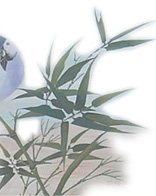|
 LISTEN TO THE TEXT LISTEN TO THE TEXT LISTEN TO SHIRLEY SANGE THE POEM LISTEN TO SHIRLEY SANGE THE POEM
 Hi, friends, today, I would like to introduce a new Chinese classical poem ? Bie Dongda ? A Farewell Song For Dongda by Tang Dynesty(A.D.618- A.D.907) poet ? Gao Shi (A.D.704- 765 A.D.). Hi, friends, today, I would like to introduce a new Chinese classical poem ? Bie Dongda ? A Farewell Song For Dongda by Tang Dynesty(A.D.618- A.D.907) poet ? Gao Shi (A.D.704- 765 A.D.).
Gaoshi had a dream to create a great career from his young times, but, his road was not easy when he was young, even, he had been a beggar. But he still kept his dream and finally, when he was about 50 years old, he became one of the 10 Jie Du Shi --governors in the country, who was in charge of both civil and military things of one or more provinces. He was the only poet on this position in Tang Dynasty.
Gaoshi had written a lot of long and great poems to sing the landscape of the border area and the war field. Both Gaoshi and Chenshen are the most important and representative poets of heroism genre in Tang Dynasty. To be called "Gao and Chen" in Chinese poety history.
This is a Juju. As a small send-off poem, instead of writing it as a sad one, Gao Shi made it full of the confidence and encouragement with an optimistic life atitude. :-)
Instead of using my piano, frist time, I wrote and played my music with a string music with the YAMAHA Key Board to accompany myself when I was singing it. Hope it is helpful to you to reamember the words in the peom. :-)
Note: Please hit any Chinese word to see its Chinese pinyin, meaning and pronunciation
MAIN MEANING OF THE PEOM  LISTEN TO SHIRLEY SANGE THE POEM: LISTEN TO SHIRLEY SANGE THE POEM:
Thousand miles yellow clouds are covering the white sun,
the north wind is singing aloud
and the snow is dancing quickly.
to send off the wild geese flying to the south.
Don't worry there is no a bosom friend ahead of your road,
Who do not know you as a famous musician in the world?
Translation By Beijing Star-light Translation Center:
A Farewell Poem to Dong Da
by Gao Shi
The sun in dimly white,
the 1000-Li clouds yellow,
The cold wind blows the wild geese in drifting snow.
Don’t worry about any bosom friend ahead of road;
All over the native land,
everyone knows you.
 NEW WORDS: NEW WORDS:
Śąę: b√≠e --leave, part from
ŤĎ£Ś§ß: d«íng d√† -- person's name. Dong Da was a famous musician who was good at lyre in Tang Dynasty. His real name is Tong Laiting (ŤĎ£Śļ≠ŚÖį)ÔľĆ was a good friend of the poet's. Because he was the oldest one among his brothers, so, he was called ŤĎ£Ś§ß. Dong is his family name.
Note: In Chinese, family name is at the first and giving name is at the second.
ŚćÉťáĆ: qińĀn l«ź -- thousand li
ŚćÉ: qińĀn --thousand
ťáĆ: l«ź -- a Chinese unit of length, 1 li = 500 meters, 2 li = 1000 meters and 1 kilometer. (When I work on my translation, I think a poem is just an art, so, I do not like to account how many miles one thousand li equals and just say, thousand miles. )
ťĽĄšļĎ:
ťĽĄ: hu√°ng-- yellow
šļĎ: y√ļn-- cloud, clouds
ÁôĹśó•: b√°i r√¨ -- white sun
ÁôĹ: b√°i -- white
śó•: r√¨ -- sun
śõõ: xŇęn -- dusky
ŚĆóť£é: bńõi fńďng -- the north wind
ŚĆó: bńõi -- north
ť£é: fńďng -- wind
ŚźĻ: chuńę --blow
ťõĀ: y√†n -- wild goose
ťõ™Áļ∑Áļ∑Ôľöxuńõ -- snow is flying in the air, means the snow is heavy
ŤéꜥĀ:m√≤ ch√≥u -- not worry
Ťéę: m√≤ -- no, don't
śĄĀ:ch√≥u -- worry, being anxious
ŚČćŤ∑Į:
ŚČć: ji√°n -- ahead
Ť∑Į: l√Ļ -- road, way
śó†: w√ļ -- there is no
Áü•Ś∑Ī: zhńę j«ź-- bosom friend
Ś§©šłč-- tińĀn xi√† -- under the sun, whole China under heaven, all over the world, between heaven and earth, all under heaven
ŤįĀšļļ: shu√≠ r√©n -- who
šłćŤĮÜ: b√Ļ sh√≠ -- do not know
šłć: b√Ļ -- no, don't
ŤĮÜ: sh√≠ --know, recognize
Śźõ: jŇęn -- gentleman, you
CHINESE PRONUNCIATION  LISTEN TO SHIRLEY SANGE THE POEM: LISTEN TO SHIRLEY SANGE THE POEM:
QińĀnl«ź hu√°ngy√ļn b√°ir√¨ xŇęn,
bńõifńďng chuńę y√†n x«Ēe fńďnfńďn„Äā
M√≤ch√≥u qi√°nl√Ļ w√ļ zhńęj«ź,
tińĀnxi√† shu√≠r√©n b√Ļ sh√≠ jŇęn„Äā
CHINESE CHARACTERS:
Please hit any Chinese word to see its Chinese pinyin, meaning and pronunciation
ŚąęŤĎ£Ś§ß
ťęėťÄā(704-765)
ŚćÉťáĆťĽĄšļĎÁôĹśó•śõõ,
ŚĆóť£éŚźĻťõĀťõ™Áļ∑Áļ∑„Äā
ŤéꜥĀŚČćŤ∑Įśó†Áü•Ś∑Ī,
Ś§©šłčŤįĀšļļšłćŤĮÜŚźõ„Äā
 That is all for this poem, hope you enjoy it. That is all for this poem, hope you enjoy it.
If you have any questions, comments and suggestions, please write to shirley@ebridge.cn , or shirleyz004@yahoo.com, You are welcomed.
--Shirley
Written, Edited and Recorded On Sun, Dec 4, 2005
|

